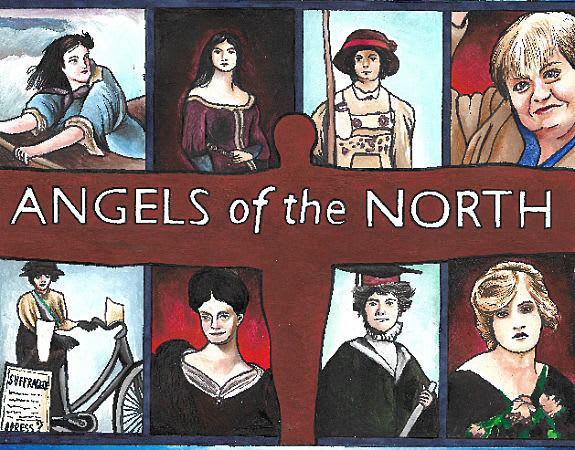For thirty years, Gillian Hambleton has been at the helm of Northumberland Theatre Company. Rural theatre is often fairly conservative, playing safe for the circuit of small scattered venues far from the radical zeitgeist of the big cities. And Northumberland is the least populated county in England.
But Hambleton brings an innovative director’s touch to the company, investing the plays with her own visual flair and originality. Despite this, eight years ago, NTC lost its core funding, a bitter blow that could have floored a less determined outfit.
Also, small-scale touring is a young person’s game, the daily grind of setting up, performing, taking down, moving on. No wonder many burn out or settle for home-based productions, or just take up a sensible job. NTC battled on and travel to 14 separate locations with the current play, a two-hander adapted by Hambleton and Louis Roberts (Roberts directs and is Hambleton’s successor), based on the book of the same name by Joyce Quin and Moira Kilkenny.
The book was published in 2018 to mark the 100th anniversary of the first women getting the vote and celebrates the lives of a clutch of noteworthy women from the region, some well-known, several new to me and I suspect to others.
Hambleton officially retired recently but steps on stage here to announce her real identity and tell us she has been persuaded to return for this last project in which, for the first time as far as I know, she also performs for NTC. Her fellow actor is Alice Byrne and together they give us glimpses into the lives of eight of the 40 women covered by the book.
There’s not a great deal new to say about Longstone Lighthouse heroine Grace Darling, nor that great Arabia adventurer Gertrude Bell, both of whom are pretty well exposed elsewhere. I knew less about Anna Richardson, the anti-slavery campaigner, or Kathleen Brown, suffragette and the North East’s first female hunger striker, or the Cook sisters from Sunderland, whose eye-catching description is “opera buffs and heroines of the holocaust”. One of the sisters even found time to pen Mills & Boon novels.
With only two actors, 45 minutes playing time and seven or eight women to cover, there is inevitably a sense of summary about the production and little chance for much dramatic re-enacting of their lives.
Thus the format is a series of monologues as the actors adopt the various roles and fill us in on the details. For variety, the two also have a bit of personal banter and do jump in and out of the characters rather than using a straight linear format.
Some of this is humorous too, but small audiences are notoriously wary of laughing, as if they need the safety of large numbers to grant them permission. The coronavirus fears meant we were a brave huddle of only 20 folk and inhibited from loud laughter.
I suspect times are not easy for the company. No printed programme here and a set much more basic than I’d come to expect from them. For three decades, they have proved survivors while many similar small touring companies in the region are now but a memory.
We lose this kind of theatre at our peril, this antidote to the glitzy commercial stuff, the musicals, the TV spin-offs. When all this virus issue finally settles down le’s hope NTC is still standing. We need it. But how many other directors, especially female, in the North East, will survive at one company in the hurly-burly of small-scale touring for three decades?
